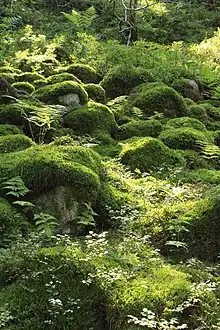moss-grown
English
WOTD – 22 April 2020
Etymology

From moss + grown.[1] Sense 2 (“old; old-fashioned, out of date”) refers to the fact that moss will often grow on an object that has remained outdoors in one place for some time.
Pronunciation
- (Received Pronunciation) IPA(key): /ˈmɒsɡɹəʊn/
Audio (Southern England) (file) - (General American) IPA(key): /ˈmɔsˌɡɹoʊn/
Adjective
moss-grown (comparative more moss-grown, superlative most moss-grown)
- Having a covering of growing moss.
- Synonyms: moss-covered, mossy
- c. 1597 (date written), [William Shakespeare], The History of Henrie the Fourth; […], quarto edition, London: […] P[eter] S[hort] for Andrew Wise, […], published 1598, →OCLC, [Act III, scene i]:
- Diſeaſed nature oftentimes breakes forth, / In ſtrange eruptions, oft the teeming earth / Is with a kind of collicke pincht and vext, / By the impriſoning of vnruly wind / Within her vvombe, vvhich for enlargement ſtriuing / Shakes the old Beldame earth, and topples down / Steeples and moſſegrovvn towers.
- 1717, Alexander Pope, “Eloisa to Abelard”, in The Works of Mr. Alexander Pope, volume I, London: […] W[illiam] Bowyer, for Bernard Lintot, […], published 1717, →OCLC, page 424:
- In theſe lone walls (their days eternal bound) / Theſe moſs-grown domes with ſpiry turrets crown'd, / Where awful arches make a noon-day night, / And the dim windows ſhed a ſolemn light; / Thy eyes diffus'd a reconciling ray, / And gleams of glory brighten'd all the day.
- 1814 July 7, [Walter Scott], “Castle-building”, in Waverley; […], 2nd edition, volume I, Edinburgh: […] James Ballantyne and Co. for Archibald Constable and Co.; London: Longman, Hurst, Rees, Orme, and Brown, →OCLC, page 51:
- In one spot distinguished by a moss-grown gothic monument, which retained the name of Queen's Standing, Elizabeth herself was said to have pierced seven bucks with her own arrows.
- 1826, [Mary Shelley], chapter IV, in The Last Man. […], volume III, London: Henry Colburn, […], →OCLC, page 111:
- [A]ll these objects were as well known to me as the cold hearth of my deserted home, and every moss-grown wall and plot of orchard ground, alike as twin lambs are to each other in a stranger's eye, yet to my accustomed gaze bore differences, distinction, and a name.
- 1835 October 23, William Lincoln, An Address Delivered before the American Antiquarian Society, at Their Annual Meeting, October 23, 1835, in the Unitarian Meeting-house, Worcester, in Relation to the Character and Services of Their Late Librarian, Christopher C. Baldwin, Esq., Worcester, Mass.: Printed for the American Antiquarian Society, by Henry J. Howland, →OCLC, pages 6–7:
- As we pass onward, we catch the amusing incidents by the way, explore the villages, meditate among their grave yards, and pluck the grass away from the moss grown head stones to decypher the names of those who sleep beneath.
- 1895, Sophie F[rancis] F[ane] Veitch, “A Lost Hat”, in A Modern Crusader, London: Adam & Charles Black, →OCLC, page 72:
- Immediately beyond the bridge, on the right-hand side of the road, a rusty iron gate, between solid but mouldy stone pillars, surmounted with mossgrown stone balls, imparted an air of yet lingering importance to what had once been a well-kept walled garden, [...]
- 1988, John Muir, “Wrangell Island and Alaska Summers”, in Travels in Alaska (The John Muir Library), San Francisco, Calif.: Sierra Club Books, →ISBN, part 1 (The Trip of 1879), pages 21–22:
- Stumps and logs, like precious monuments, adorned its two streets, each stump and log, on account of the moist climate, moss-grown and tufted with grass and bushes, but muddy on the sides below the limit of the bogline.
- (figuratively) Old; old-fashioned, out of date.
- Synonyms: antiquated; see also Thesaurus:old
- 1838, [Edmund Flagg], chapter XXV, in The Far West: Or, A Tour beyond the Mountains. […] In Two Volumes, volume II, New York, N.Y.: Published by Harper & Brothers, […], →OCLC, page 32:
- To find one's self suddenly translated from the wild, flowery prairie into the heart of an aged, moss-grown village, of such foreign aspect, withal, was by no means easy to reconcile with one's notions of reality.
- 1840, “Chivalry and the Crusades”, in The American Miscellany of Popular Tales, Essays, Sketches of Character, Poetry, and Jeux d’Esprit, volume II, number 38, London: G. Berger, […]; Simpkin, Marshall, & Co.; […], →OCLC, page 134, column 1:
- It was reserved for chivalry, embodying the spirit of christianity, to demolish this old, moss-grown bastile of the social state, and restore its captives to freedom, and the rights and prerogatives of freedom.
- 1904, Alfred Henry Lewis, “How a President is Bred”, in The President: A Novel, New York, N.Y.: A[lfred] S[mith] Barnes and Company, →OCLC, page 24:
- The native State of Patrick Henry Hanway was a moss-grown member of the republic and had been one of the original thirteen. It possessed with other impedimenta a moss-grown aristocracy that borrowed money, devoured canvasbacks, drank burgundy, wore spotless tow in summer, clung to the duello, and talked of days of greatness which had been before the war. It carried moss-grown laws upon its statute books [...]
- 1932, “Introduction”, in F[rank] L[aurence] Lucas, compiler, Alfred, Lord Tennyson: An Anthology, Cambridge, Cambridgeshire: At the University Press, →OCLC, page xx:
- [T]he magnificent young poet [Alfred, Lord Tennyson] of the bust by [Thomas] Woolner in Trinity College Library had grown gradually more like, if never really like, the dim and moss-grown mystic of the painting by [George Frederic] Watts in Trinity College Hall.
Alternative forms
Related terms
Translations
having a covering of growing moss
References
- “moss-grown, adj.”, in OED Online
 , Oxford, Oxfordshire: Oxford University Press, December 2002; “moss-grown, adj.”, in Lexico, Dictionary.com; Oxford University Press, 2019–2022.
, Oxford, Oxfordshire: Oxford University Press, December 2002; “moss-grown, adj.”, in Lexico, Dictionary.com; Oxford University Press, 2019–2022.
This article is issued from Wiktionary. The text is licensed under Creative Commons - Attribution - Sharealike. Additional terms may apply for the media files.